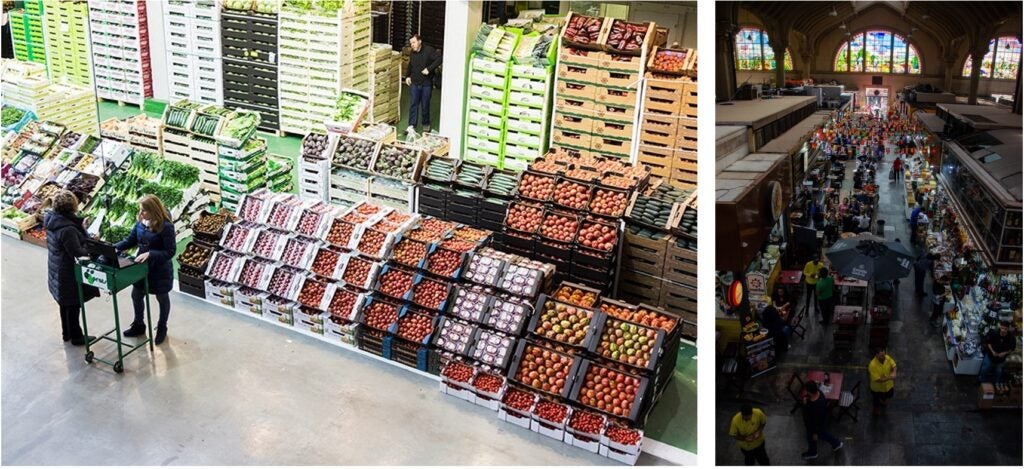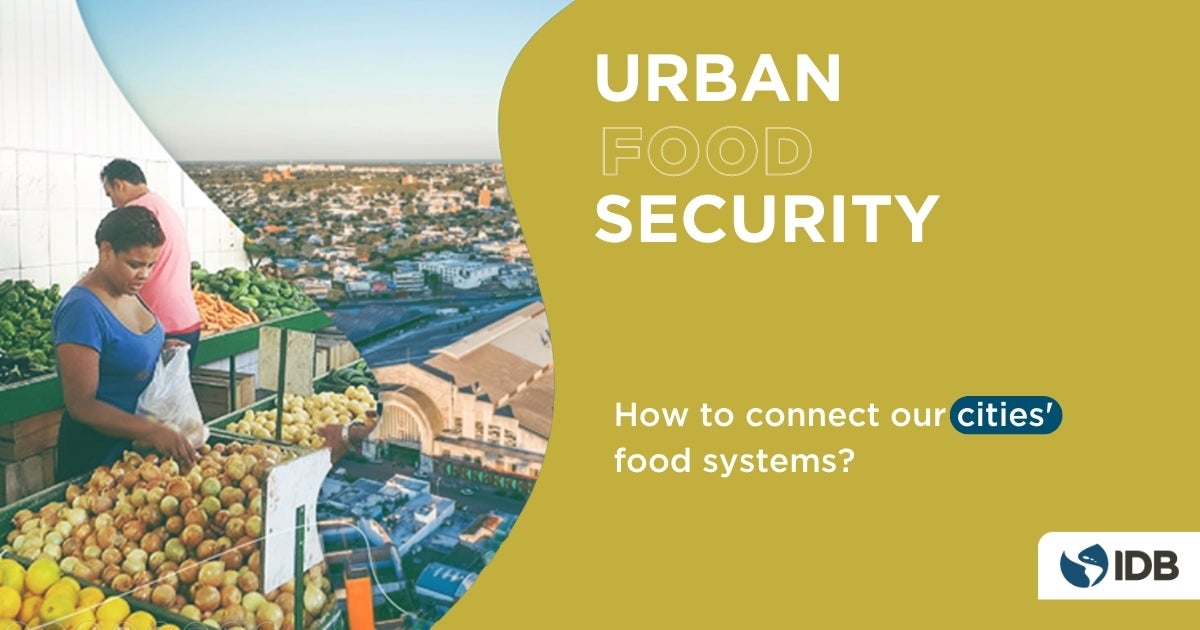Este artículo está también disponible en / This post is also available in: Spanish
Have you ever thought about the path that food follows from the farm to the market? This is known as the food supply and distribution system, and is composed of six stages: origin, transformation, storage/conservation, transport-distribution, sale and consumption. Cities play a leading role in most of them, so their planning and management are vitally important elements for their proper functioning.
The enormous volume of food consumed in cities, the large number of agents (and jobs) linked to supply and distribution, the intensity of urban flows and the level of space occupation that this generates translate into an enormous daily logistical challenge.
Addressing food security in cities requires involvement at different levels, from the neighborhood-city level to the city-region level. It is critical to address the supply chains that connect farmers to urban markets, with their implications for transportation and logistics, storage, food security, etc. Increasingly, we expect cities to find solutions to food problems that arise within their borders. However, many of these problems transcend borders and require cross-jurisdictional governance mechanisms.
In this article, part of a series on urban food security in Latin America and the Caribbean (LAC), we will discuss the importance of urban food systems governance that effectively connects the city to its entire territory. Keep reading to learn more details.
How should our cities’ food systems be planned?
As food systems evolve, there is a greater need to manage them from a localized, municipal and regional scale, spanning urban, peri-urban and rural space. The combined pressures of urbanization call for a stronger dialogue on urban food policy.
The sheer number of parties involved in the functioning of food markets – and the processes of sourcing, distribution, as well as marketing – highlights the importance that market governance mechanisms must be inclusive to incorporate a variety of food system actors, from production to consumption.
Public authorities, in their different competencies, from local to national governments, are responsible for ensuring adequate food supply and means of access to food for populations. What is the role of public authorities? They are involved from coordination with stakeholders at different stages of the agri-food system, to investment in the necessary infrastructure and the establishment of financial and legislative frameworks that allow food market actors to operate, while regulating impacts on livelihoods and the urban environment.
Food system planning is therefore a community-based, multi-stakeholder process that will involve gradually widening circles in a truly public exercise. To take into account the dimension of people and institutions, multi-actor planning is required to include food social networks at various levels and to foster new forms of democratic governance – such as multi-sectoral participatory authorities and food councils. These must be able to manage power relations between different actors to define food commitments and strategic plans for the city, neighborhood or region. Likewise, food system planning should also consider spatial dimensions, and materialize the vision of the different stakeholders, usually through a master plan at the city and regional level, complemented by physical and land use plans, as well as zoning regulations at the neighborhood and district level.

Ecuador: city-region vision in Quito
An example of a multi-stakeholder process with a city-region vision can be found in the Quito planning process. In the case of Ecuador, it was supported by civil society through the multisectoral platform Pacto Agroalimentario de Quito (PAQ), which included a draft “Food Policy and Action Plan for consideration by the local government”. The PAQ drafted and approved a “Food Charter for the city” which was signed by the municipality and presented publicly
On the other hand, the city’s planning process is supported by the incorporation of food in the city’s planning instruments, such as the Quito Vision 2040, the Resilience Strategy and guidelines of the Metropolitan Planning and Development Plan 2015-2025, and the Quito Agrifood Strategy. The strategy aims to address problems related to food insecurity, obesity, diet-related diseases, nutrition, health, environmental and waste management. It also includes income generation and employment opportunities by supporting local food value chains and sustainable agriculture to achieve local economic development in both rural and urban territories.
As seen in the case of Quito, the complexity of interactions along food value chains, from rural or peri-urban areas to final consumers in cities, requires an integrated approach to governance of infrastructure, logistics and services. In addition, the scale of analysis for the governance of food supply and distribution activities is necessary to shift from a solely urban or rural approach to a broader perspective that encompasses the heterogeneity of the territories that cover the stages of the agri-food system.
Argentina: urban and peri-urban agriculture program in Rosario
Another good practice can be found in Rosario, Argentina. Due to the economic recession in Argentina, the city of Rosario initiated a flagship urban and peri-urban agriculture program designed to improve food security. In 2002, they began working with UN-Habitat’s Urban Management Program and the National University of Rosario on an inventory of vacant and underutilized urban land that could be reused for agricultural plots.
The inventory found that 36% of the municipal area was suitable for agricultural conversion, including land along railroads and highways, flood-prone lowlands, and designated greenbelts. Over the years, a more comprehensive approach to the food problem developed.
Since 2015, agroecological productive strategies have been extended to the peri-urban area of the Rosario Metropolitan Area. The approach was also cross-cutting and multidisciplinary, consolidating a trained technical team and articulating different areas.
Interested in this topic: register to our webinar
Cities are connecting food systems at the metropolitan level ensuring effective governance around food security. They are also making it clear how a metropolitan government can have greater access to human and financial resources, and more responsibility and authority to govern service delivery across a geographic area and economic area.
Effective governance of urban food systems requires interventions to be implemented in many sectors. In this sense, the experience of cities such as Quito and Rosario shows us that innovation is not only about applying the latest technology, but also about carrying out a social and institutional innovation exercise that helps governments and stakeholders to address socio-economic and environmental problems and provide tools to strengthen human capital.
On August 9,2023, the IDB organized the webinar How to connect food systems and city systems: the role of the metropolitan scale where this question was answered: How to connect the food systems of our cities? Don’t miss the recording of the webinar:


Leave a Reply